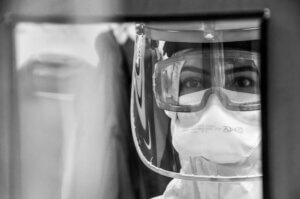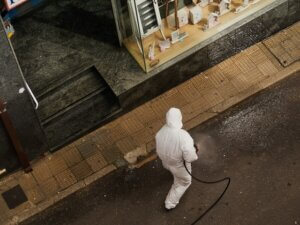The Evolution of Forensic Cleaning Techniques
The Evolution of Forensic Cleaning Techniques
Forensic cleaning, also known as crime scene cleaning, has come a long way since its inception. This article delves into the rich history and progression of forensic cleaning techniques. We will explore how advancements in technology, science, and methodology have transformed this crucial aspect of crime scene investigations. From the earliest methods to the cutting-edge practices used today, we will uncover the remarkable journey of the evolution of forensic cleaning techniques.
Origins of Forensic Cleaning
The inception of forensic cleaning can be traced back to ancient civilizations. Early societies recognized the need to clean and decontaminate crime scenes to prevent the spread of diseases and maintain a sense of order. Historical records mention the use of basic cleaning agents like vinegar and water for such purposes.
Pioneering Efforts in the Middle Ages
During the Middle Ages, the first systematic attempts at trauma cleaning emerged. The emergence of rudimentary cleaning methods, such as using sand to absorb bodily fluids and covering crime scenes with lime, marked significant progress in maintaining hygiene and minimizing the impact of crime scenes on public health.
Advancements in the 19th Century
The 19th century witnessed significant developments in forensic cleaning techniques. With the advent of modern chemistry and understanding of germs, cleaning agents like bleach and disinfectants became widely used. These advancements not only improved sanitation but also contributed to more effective crime scene investigations.
The Birth of Professional Forensic Cleaning Services
In the early 20th century, a shift occurred towards specialized forensic and trauma cleaning services. Trained professionals entered the scene, offering expertise in handling crime scenes and biohazardous materials. This marked the formalization of forensic cleaning as a distinct profession.
Technological Innovations in the Late 20th Century
The late 20th century brought about revolutionary technological advancements that transformed forensic cleaning. Specialized equipment, such as ozone generators and advanced cleaning agents, made crime scene cleaning more efficient and thorough. These innovations also ensured better evidence preservation during the cleaning process.
Biohazard Cleanup and Safety Standards
With a deeper understanding of biohazard risks, forensic and trauma cleaning incorporated stringent safety standards and protocols. Protective gear, specialized training, and adherence to OSHA guidelines became fundamental aspects of modern forensic cleaning practices.
Environmentally Friendly Solutions
The 21st century saw an increased focus on eco-friendly practices in forensic cleaning. Environmentally friendly cleaning agents and sustainable disposal methods have become essential for responsible and ethical crime scene cleaning.
The Role of Technology
In recent years, technology has continued to play a vital role in forensic cleaning. High-tech cleaning equipment, such as UV-C sterilizers and thermal fogging machines, have further improved the efficiency and effectiveness of the cleaning process.
Specialized Training for Forensic Cleaners
As forensic cleaning becomes more complex, the demand for highly trained professionals has increased. Accredited training programs and certifications have become essential for forensic cleaners to stay up to date with the latest techniques and standards. Learn more about the Australian IICRC certifications here.
The Future of Forensic Cleaning
As technology continues to advance, the future of forensic cleaning holds promising possibilities. From drone-based crime scene documentation to advanced cleaning agents, the future will likely bring even more efficient and sophisticated methods to support investigations.
FAQs
What is the primary goal of forensic cleaning?
The primary goal of forensic cleaning is to decontaminate and restore crime scenes to a safe and healthy environment.
Is forensic cleaning only required for crime scenes?
No, forensic cleaning is also necessary for trauma scenes, unattended deaths, and other incidents involving biohazards that require specialized cleaning and decontamination.
How long does forensic cleaning typically take?
The time required for forensic cleaning varies depending on the size of the crime scene and the severity of the contamination. It can range from a few hours to several days.
Are there any health risks associated with forensic cleaning?
Yes, forensic cleaning involves handling biohazardous materials, making them potentially dangerous. Professional forensic cleaners use protective gear and follow safety protocols to minimize risks.
Can family members clean a crime scene themselves?
It is not recommended for family members or untrained individuals to clean a crime scene due to the potential health risks and lack of expertise. Professional forensic cleaners should be hired for such tasks.
How can I become a certified forensic cleaner?
To become a certified forensic cleaner, you can enrol in accredited training programs offered by reputable institutions. These programs provide the necessary knowledge and skills for a career in forensic cleaning.
The evolution of forensic cleaning techniques has been a remarkable journey, driven by the need to preserve evidence, protect public health, and support law enforcement investigations. From basic methods in ancient times to the cutting-edge practices of the digital age, forensic cleaning has come a long way. With advancements in technology and increasing awareness of safety and environmental concerns, the future of forensic cleaning looks promising. As this critical field continues to evolve, trained professionals will play an essential role in ensuring the integrity of crime scenes and contributing to the pursuit of justice.
Why Choose AllAces?
AllAces Cleaning & Restoration has more than 35 years of industry experience, specialising in forensic and trauma cleaning services to ensure a safe and healthy environment is returned asap. We understand the sensitive and urgent nature of these jobs with 24/7 availability and highly trained IICRC-certified technicians ready to take over a scene.



